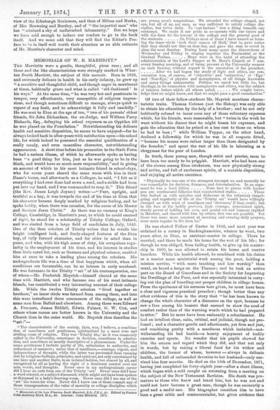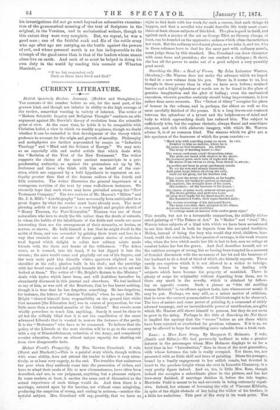MEMORIALS OF W. B. MARRIOTT.*
* Memorials of the late Wharton Booth Marriott, B.D., FAA., 1-c. Edited by Fenton John Anthony Hort, Id-EL, dte. London : John Mitchell. 1875.
THE Marriotts were a gentle, thoughtful, pious race ; and all these and the like characteristics were strongly marked in Whar- ton Booth Marriott, the subject of this memoir. Born in 1823, and extremely delicate in health in his early infancy, he grew up a sensitive and thoughtful child, and though eager in merriment at times, habitually grave and what is called ' old-fashioned ' in his ways." At the same time, "he was very hot and passionate in temper, very affectionate, very susceptible of religious impres- sions, and though sometimes difficult to manage, always quick to repent of any fault, and to acknowledge it fully and candidly."
He was sent to Eton at the age of ten, "two of his parents' oldest Mends, Sir John Richardson, the ex-Judge, and William Parry Richards, Esq., defraying his school expenses as an Oppidan till he was placed on the Foundation." Notwithstanding his delicate health and sensitive disposition, he seems to have enjoyed—for he always looked back in after-years with satisfaction upon—his school life, for which indeed he possessed the essential qualification of a really manly, and even masculine character, notwithstanding appearances. A short time before his promotion to the Sixth Form he had a serious illness, of which he afterwards spoke as having been "a good thing for him, just as he was going to be in the Sixth, and would have so much more responsibility," and in giving an account of which to his most intimate friend in school-days, who for seven years shared the same room with him in their Dame's house, and afterwards as a Colleger, he said, "I felt as if everything I had ever done had sown a seed, and a sickle had been put into my hand, and I was commanded to reap it." This friend (the Rev. James Leigh Joynes) writes :—" Pure, upright, and truthful as a boy, it was towards the end of his time at Eton that his character became deeply marked by religious feeling, and he spoke boldly, when there was occasion, for the cause of his Master and Saviour Jesus Christ." As there was no vacancy at King's College, Cambridge, in Marriott's year, to which he could succeed of right, he stood for a scholarship of Trinity College, Oxford, and was elected from a large field of candidates in July, 1843.
One of the then scholars of Trinity writes that he recalls the bright intelligent look, and finely-shaped features of the Eton boy, of fully formed character, and far older in mind than in years, and who, with his high sense of duty, his scrupulous regu- larity in the employment of his time, and his interest in studies then little cared for, such as German and physical science, enabled him at once to take a leading place among the scholars. His undergraduate life was a time of that happiness which, when all conditions are favourable, can be so intense in early manhood. He was fortunate in the Trinity " set " of his contemporaries, one of whom—Mr. Frederick Meyrick—himself elected at the same time with Marriott, and who became one of his most intimate friends, has contributed a very interesting account of their college life. While the twelve Trinity scholars "lived together as brothers," an inner circle was formed from among them, and into
this were introduced three commoners of the college, as well as some men from Balliol and elsewhere. Among these were Edward A. Freeman, James Riddell, Edwin Palmer, G. W. Cox, and
others whose names are better known in the University and the Church than in the outer world. Mr. Meyrick thus describes the "set :"—
" The characteristic of the society, then, was, I believe, a combina- tion of manliness and gentleness, spiritualised by a most true and abiding sense of religion. This was 'Trinity ;lies,' as it was commonly called in the University, sometimes in derision sometimes in admira- tion, and sometimes as merely descriptive of a phenomenon. Under the name gentleness I include purity of life, submission to authority, and refinement of manners; under that of manliness,—courage rigour, and independence of thought, while the latter was prevented from running riot by religious feelings, principles, and opinions,not only entertained by one here and another there, in an isolated fashion, but shared by all, and recognised by all as having the right of a dominant control over our acts, words, and thoughts. Never once in my undergraduate career did I hear an oath from one of the Trinity set.' Never once did I hear . a word uttered, or a subject discussed, which might not have been spoken or discussed in a lady's drawing-room. Never once did I see one of the 'set' the worse for wine. Never did I know one of them commit any of those transgressions of the rules of morality or college discipline which
are young men's temptations. We attended the college chapel, not one, but all of us, not once, as was sufficient to satisfy college dis- cipline, but twice daily. To 'cut lecture' was a thing beneath our contempt. We made it our pride to co-operate with our tutors and with the dean for the honour of the college and the general good of
the students. On Fridays most of those I have named as form- ing the inner circle took their names off Hall,' that is, gave notice that they should not dine on that day, and gave the sum so saved in alms the next Sunday. During Lent many spent the dinner-hour of Wednesday and Friday in singing together the Penitential or the
Gradual Psalms. Many were in the habit of attending the administration of the Lord's Supper at St. Mary's Church at 7 a.m. every Sunday morning, and of being present at the University sermon on each Sunday, without regard to the reputation of the preacher.
Alterwe had begun the study of logic and ethics, our con- versation was, of course, of 'objective' and 'subjective,' of ' Ego ' and Non-Ego,' of physics and metaphysics, of all things knowable and many-things unknowable. Politics we cared but little for, llut theology, in its connection with metaphysics and ethics, was the subject of interest before which all others paled We sought know- ledge that we might know, not that we might pass a good examination."
Of two of their fellow-students Mr. Meyrick mentions charac- teristic traits. Thomas Colenso (not the Bishop) was only able
to obtain his education by the help of a brother ; and he not only habitually refused to incur even any of those voluntary expensea which, for his friends, were reasonable, but "twice in the wiek he- went without his dinner that he might lessen his expenses, and gain the education that he prized at a leas cost to those on whom-
he had to lean ; " while William Tupper, on the other hand, declined a fellowship for which he was in all respects fitted, "because his means were rather larger than those designated by the founder," and spent the rest of his life in labouring as a clergyman for the poor of London.
In truth, these young men, though strict and precise, seem to-
have been too manly to be priggish. Marriott, who had been one of the eleven among Eton cricketers, was now physically strong- and active, and full of exuberant spirits, of a sociable disposition,
and enjoying all active exercises.
"Physically he was one of the strongest amongst us, and mentally he- was remarkable for decision, firmness, and determination. In an argu- ment he was a hard hitter. . . . . None tore to pieces with keener
pen our sentimental fallacies that counterfeited truths Those who looked on with surprise and disfavour at the voluntary chapel- going and regularity of life of the 'Trinity set' would have willingly- charged us with want of manliness and slowness,' if they could ; but in the face of the bodily prowess, high courage, determined spirit, sturdy power of holding his own, and genial wit and humour typified in Marriott, and share'd with him by others, this was not possible. Yet there was none more constant at morning and evening daily prayers, none more regular in life than he."
He was elected Fellow of Exeter in 1846, and next year was ordained to a curacy in Buckinghamshire, whence he went, two years after, to Eton, as assistant-master in college. There he married, and there he made his home for the rest of his life ; for- though he was obliged, from failing health, to give up his master- ship in 1860, he was allowed to retain his house and receive boarders. While his health allowed, he combined with his duties- as a master some ministerial work among the poor, holding a mission service, "with more teaching and less worship" than
usual, on board a barge on the Thames ; and he took an active
part on the Board of Guardians and in the Society for Improving the Dwellings of the Poor, and was especially interested in carry- ing out the plan of boarding-out pauper children in village homes.
From the specimens of his sermons here given, he must have been a clear and vigorous practical preacher ; though better than any other evidence of this is the story that "he has been known to change the whole character of a discourse on the spot, because he saw a face among his hearers that seemed to show the need of comfort rather than of the warning words which he had prepared to utter." But he must have been eminently a schoolmaster. He had an intellect clear, calm, critical, and judicial, though not pro- found ; and a character gentle and affectionate, yet firm and just, and combining purity with a manliness which included—not- withstanding his bad health—a hearty enjoyment of bodily exercise and sports. No wonder that his pupils showed for him the esteem and regard which they did, and that not only in words, but by raising a liberal fund for his widow and children, the former of whom, however — always in delicate health, and full of unbounded devotion to her husband—only sur- vived him four months. He died on the 16th of December, 1871, having just completed his forty-eighth year—after a short illness, which began with a cold caught on returning from a meeting on
the subject of the New Testament Revision: His death was pre- mature to those who knew and loved him, but he was not and
could not have become a great man, though he was eminently a good and a useful one. His biographer considers him to have been a great critic and controversialist, but gives evidence that. his investigations did not go much beyond an exhaustive examina- tion of the grammatical meaning of the text of Scripture in the original, in the Versions, and in ecclesiastical writers, though to this extent they were very complete. But, we repeat, he was a good man one of the faithful rank and file of the noble army who age after age are carrying on the battle against the powers of evil, and whose personal worth is no less indispensable to the triumph of the good cause than is that of the leaders whose riames alone live on earth. And each of us must be helped in doing his own duty in the world by reading this memoir of Wharton Marriott,—
"If we but remember only
Such as these have lived and died."



































 Previous page
Previous page